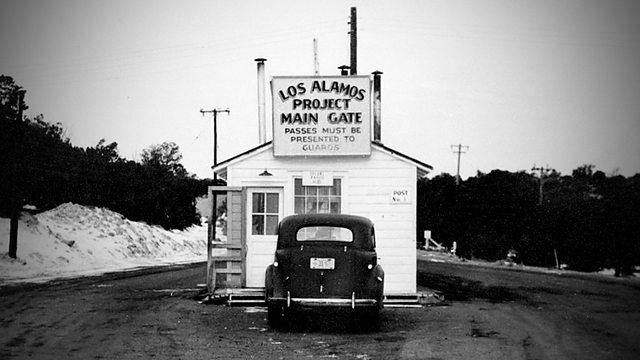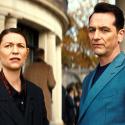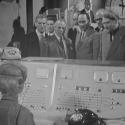Haste was of the essence as the Allies hurried to create the ultimate weapon. They were fearful that Hitler’s Germany, which had been first to split the atom, would beat them to it – and they knew that the Nazis would have no compunction about using it.
Subtitled “A Thousand Days of Fear”, this film from Tim Ward and Domenic Mastrippolito was in a hurry too, which was a shame because with the wealth of material here – interviews with many of the main players, some presumably still living, others interviewed previously (the distinction wasn't always clear), as well as some remarkable archive footage – it could have done with considerably greater length. It was a buy-in from the US (with no sign of the original broadcaster), and surely the BBC would have given it at least 90 minutes if not a couple of programmes if they'd made it themselves.
The perspective given here was that this was an American venture only
The editing style also looked distinctly American, with sequences of one talking head cut straight into another, hardly allowing viewers to breathe, let alone consider any wider perspective. History can rarely have been more obliging in providing a real-life count-up like the one that structured the fiilm – literally, from Day One, 9 January 1942 when the Manhattan Project was signed into action (completely concealed from Congress), through to Day 1,000, when the bomb was dropped.
Even for a film that set out to capture the details of the Manhattan Project – how the huge venture came together, its participants and leaders, the technical advances, but also how the team of scientists lived and passed their leisure time – the moral implications were never going to go away, though here they were shoehorned into the final minutes.
We may wonder even whether that itself reflects a more American point of view. The Race… was part of the BBC Four Goes Nuclear season marking the 70th anniversary of Hiroshima and Nagasaki, but a 50th anniversary display at Washington’s Smithsonian in 1995 provoked controversy and a sense of almost polar difference of opinions between war veterans and historians (those repercussions are well referenced in Indian documentarist Anand Patwardhan’s War and Peace). At least we got J Robert Oppenheimer’s historic screen appearance, with his moving quotation from the Bhagavad Gita, “Now I am become death, the destroyer of worlds”, at the film’s beginning and end, his words speaking as eloquently as anything here (Oppenheimer, pictured below).
 That said, Ward and Mastrippolito’s film was a revelation about unexpected aspects of the project, or at least they seemed such to the general viewer – whether there was anything new for a specialist, I can’t say. The bond between General Leslie Groves (once he’d received the promotion needed to give him necessary heft in delivering his orders) and “Oppie”, his choice as scientific director, clearly worked. Oppenheimer didn’t have a Nobel prize to his name, unlike many of his scientists, but those who had fled Europe saw the urgency of their mission with particular clarity. “Couldn’t run a hot-dog stand” was one verdict on him from another project participant, but Oppenheimer in fact proved a brilliant manager of his “prima-donna scientists”.
That said, Ward and Mastrippolito’s film was a revelation about unexpected aspects of the project, or at least they seemed such to the general viewer – whether there was anything new for a specialist, I can’t say. The bond between General Leslie Groves (once he’d received the promotion needed to give him necessary heft in delivering his orders) and “Oppie”, his choice as scientific director, clearly worked. Oppenheimer didn’t have a Nobel prize to his name, unlike many of his scientists, but those who had fled Europe saw the urgency of their mission with particular clarity. “Couldn’t run a hot-dog stand” was one verdict on him from another project participant, but Oppenheimer in fact proved a brilliant manager of his “prima-donna scientists”.
The speed of construction at Los Alamos in New Mexico (an old haunt of Oppenheimer’s) was phenomenal: at its height it was home to around 6,000 people, led by the scientific “luminaries”. They worked six-day weeks but also found time to relax, as we saw here in archive film: swimming, skiing (they used their own explosives to clear trees from the slope), and occasional excursions to Santa Fe. Those had to be hush-hush, with false names used. A decoy trip was even made with scientists sent there to drink and specially spread disinformation among locals about what they were really up to. A baby boom ensued among the scientific colony, and there was even an on-site brothel (to which Groves turned a blind eye).
 Secrecy was paramount: the remarkable physicist Richard Feynman was in the habit of writing to his wife in code anyway, so deciphering keys had to be enclosed for the censors to work with. Even that wasn’t enough to prevent spies getting in, though the main one, Klaus Fuchs, came with the British delegation and was reporting to the Soviets (the perspective given here was that, even with so many eminent contributors from Europe, this was an American venture only.) Such espionage worked in the other direction too, with a desperate need to discover how the enemy was proceeding: an agent was infiltrated into Switzerland, where Werner Heisenberg, the chief scientist behind the German effort, had been allowed out to give a rare lecture. Luckily, for his own sake not least, Heisenberg gave no impression that he was revealing details to anyone, otherwise the American agent had a gun on him and wouldn’t have hesitated to use it (his decision not to shoot a rare gesture of humanity in this story).
Secrecy was paramount: the remarkable physicist Richard Feynman was in the habit of writing to his wife in code anyway, so deciphering keys had to be enclosed for the censors to work with. Even that wasn’t enough to prevent spies getting in, though the main one, Klaus Fuchs, came with the British delegation and was reporting to the Soviets (the perspective given here was that, even with so many eminent contributors from Europe, this was an American venture only.) Such espionage worked in the other direction too, with a desperate need to discover how the enemy was proceeding: an agent was infiltrated into Switzerland, where Werner Heisenberg, the chief scientist behind the German effort, had been allowed out to give a rare lecture. Luckily, for his own sake not least, Heisenberg gave no impression that he was revealing details to anyone, otherwise the American agent had a gun on him and wouldn’t have hesitated to use it (his decision not to shoot a rare gesture of humanity in this story).
The moral debate about using the bomb, which had some of the scientists signing a last-minute petition that it should not be dropped – Albert Einstein later regretted that he had signed the initial warning letter to Roosevelt stressing the need to initiate the project – felt compressed into the film’s conclusion, and other questions weren’t raised at all. Would the allies have used it against Hitler if it had been ready earlier, and dropped it on Europe? How much did it become an unspoken weapon against Stalin, with Truman receiving the news that the first New Mexico test had been successful at the Potsdam conference? The stress here was resolutely on the millions who would have died in any final offensive against Japan. A final irony, then, to learn that the Japanese generals would have fought on anyway, to the bitterest end, and they were only stopped by Emperor Hirohito’s unprecendented decision to surrender.















Add comment